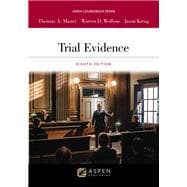Well-known and experienced authors, highly respected in the clinical field, Thomas A. Mauet, Warren D. Wolfson, and Jason Kreag provide a complete review of the effective use of evidence in a trial setting. Trial Evidence, Eighth Edition is structured around the way judges and trial lawyers think about evidentiary rules, with particular focus on the Federal Rules of Evidence. Abundant real-life courtroom vignettes illustrate how evidentiary issues arise, both before and during a trial. Logical content organization follows the sequence of a trial: opening statement, direct examination, cross examination, and closing arguments. “Law and Practice” sections throughout the book are based on actual federal and state cases and bring decades of practical experience into the evidence classroom. The accessible style of Trial Evidence always focuses on practice over theory, on applying the statute rather than reading it.
New to the Eighth Edition:
- Revised Rule 106 (Rule of Completeness) and the implication of hearsay objections
- Revised Rule 615, clarifying the judge’s authority to ensure witnesses do not have access to prior testimony and evidence before testifying
- Revised Rule 702, strengthening the judge’s gatekeeping role for expert testimony
- Revised Rule 807, clarifying the residual hearsay exception
- New problems exploring these revised rules and other contemporary evidence issues
Professors and students will benefit from:
- Clear, objective, up-to-date explanations of evidence issues
- Content organization that flows logically through the stages of a trial
- Evidence law organized around the 3R’s approach: relevant, reliable, and right
- A companion piece including hundreds of problems based on real, cited cases and focused on important, current issues









